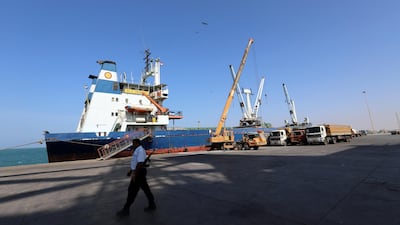The UN Security Council on Wednesday unanimously approved an expanded ceasefire monitoring mission in Yemen's Red Sea port of Hodeidah, allowing 75 observers to be deployed there for six months to try and ensure the fragile truce stays on track.
The resolution will almost quadruple the number of UN staff tasked with enforcing the ceasefire, which was agreed between Yemen's government and the country's Houthi rebels during peace talks in Sweden last month.
Hodeidah is the point of entry for most of the nation's commercial goods and aid supplies and a cessation of violence is considered vital to speed up delivery of much needed food and medical supplies.
The UN monitoring team was initially given a 30-day mandate in December. The ceasefire – which does not apply in other regions – has stumbled since it came into force on December 18. The Saudi-led Arab military coalition that backs Yemen's government has accused the Houthis of repeated violations.
Wednesday's British-drafted resolution means the larger UN operation will now be called the United Nations Mission to support the Hodeidah Agreement (UNMHA). It also covers the neighbouring ports of Salif and Ras Issa.
“There has been a welcome de-escalation around Hodeidah but there are still provocative acts being carried out, particularly by one of the parties,” Karen Pierce, Britain's ambassador to the UN, told reporters minutes before the larger observer mission was approved.
“Hopefully we can start to make progress,” she added.
The UN resolution's text requests that member states, particularly neighbouring states, “support the UN as required for the implementation of UNMHA's mandate".
Despite continued violence, the fighting has diminished significantly in and around Hodeidah, according to the UN.
But the monitoring operation has experienced significant problems. It emerged on Monday that Patrick Cammaert, the former Dutch general leading the UN mission in Hodeidah, in the past seven days had to shuttle between government officials and the Houthis for separate discussions as the rival sides are unwilling to meet face to face. The setback came despite a joint Redeployment Co-ordination Committee being set up to try and build trust between the rivals and ensure that the ceasefire is fully realised through a withdrawal of troops and fighters in Hodeidah. Under the peace proposals, known as the Stockholm Agreement, they are to be replaced by locally agreed on forces and an enhanced role for the UN at Hodeidah, and two other ports to ensure faster delivery of aid. Who will comprise the new forces was a major sticking point during the two meetings of the joint committee that took place under Mr Cammaert's chairmanship before the forum broke down.
It is hoped that the six month timeframe will allow the UN and the ex-general, a veteran of numerous peacekeeping operations, more time for the ceasefire to take root.
_______________
Read more:
Jordan says it will host Yemen talks on prisoner exchange deal
Mike Pompeo says Houthi rebels violating Hodeidah ceasefire
Houthi rebels threaten more drone attacks
Yemen rivals no longer ‘willing’ to meet jointly over Hodeidah, UN says
_______________
In his proposal to the council last month, UN Secretary General Antonio Guterres described the planned 75-strong team as “a nimble presence” to monitor compliance of the deal and establish and assess facts and conditions on the ground.
That includes the redeployment of forces and efforts to de-mine the area to help aid deliveries. Under the new resolution's terms, Mr Guterres will now report to the council on the latest findings regarding the ceasefire on a monthly basis rather than weekly.
But it will also involve greater resources to ensure the safety of UN staff, including armoured vehicles, aircraft, communications equipment and medical back up to boost the progress made under UN special envoy to Yemen, Martin Griffiths.
Doing so “would provide important support for his efforts to facilitate an inclusive political process aimed at reaching a negotiated settlement that will bring about a permanent end to the conflict in Yemen” Mr Guterres said.
Separately, the secretary general's spokesman said Mr Cammaert had been assured in writing by both Yemen's government and the Houthis that they would allow UN humanitarian officials to access Red Sea mills that have been holding unused foodstuffs for months.
The estimated 51,000 metric tonnes of commodities are enough to feed more than 3.5 million people for a month, the spokesman added, noting that the UN team led by Mr Cammaert intends to agree plans to access the supplies in the next few days.

